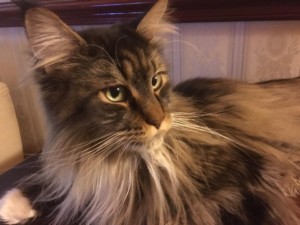This week Liesbeth continued her studies on the feline medicine certificate programme in Swindon. The feline gastrointestinal tract and liver disease were covered in detail, followed by a further day on feline endocrinology.
The feline gastrointestinal tract day was lectured by Professor Tim Gruffydd-Jones B.Vet.Med.(Lond.), Ph.D.(Bristol), M.R.C.V.S. who is an RCVS specialist in feline medicine. The day started examining oral diseases. Feline gingivitis and dental disease of varying degrees is present in around 80% of feline patients we see at Westport. Dental disease is frequently picked up on routine examination when cats are presented for annual vaccinations, but can also be a complicating factor when we are treating sick cats with various other diseases. We have a particular interest in treating these cats with dental disease and oral pain, as we find their quality of life can vastly improve after treatment. We have invested in specific dental radiography and equipment to help us address this common but often overlooked problem.
The afternoon was spent discussing vomiting and diarrhoea in cats. Often cases of vomiting and diarrhoea in cats presented to us are mild and self limiting or resolve with some symptomatic treatment. However we have some feline patients which require more intensive management such as those cats which develop pancreatitis, a more serious condition involving inflammation of the pancreas which often requires hospitalisation. Interesting gastrointestinal case studies were covered including surgical biopsies of the gastrointestinal tract and pancreas. The day ended on liver disease and the best diagnostics and medical management of these cases.
The second day was spent on feline endocrinology which covers areas such as diabetes mellitus and feline hyperthyroidism. The speaker was Nick Bexfield BVetMed PhD DSAM DipECVIM-CA PGDipMEdSci PGCHE FHEA MRCVS who is Director of Small Animal Medical Services at the University of Cambridge. Feline hyperthyroidism, along with feline renal disease, are the most common disease processes we have to treat at Westport in our older feline patients. Feline hyperthyroidism is the most common endocrinopathy of cats in the UK but fortunately there are lots of options for treatment ranging from medical management to surgery and even radioactive iodine. We discussed the benefits and side effects of all these options and the ongoing monitoring of these cats. The afternoon was spent on the more rare but serious endocrinopathies of cats such as feline acromegaly, a condition in which a growth in the pituitary gland secretes too much growth hormone causing multiple organ problems but importantly an insulin resistant diabetes.

